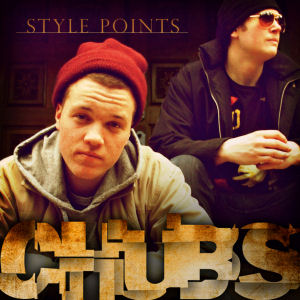Though established in the early 1980s, Canadian hip-hop has only recently flourished on an international level. With Toronto-based artists such as Drake, Kardinal Offishall and K’naan going mainstream, Canadian hip-hop has finally started to get its shine on. However, the only things these artists share in common are their success and origin. Despite Canadian rap being popular at the moment, there has yet to be a defining style to catapult it to the level that G-funk and gangsta rap did for the west coast or crunk music did for Atlanta. Nonetheless, a diverse mix of music like American hip-hop, Caribbean sounds and Canadian and American rock music have undeniably played a significant role in influencing rap music north of the border. Released in April 2011, “Style Points” is the debut album from Victoria, British Columbia-based emcee Chubs. Much like Canadian hip-hop on the radio, this nine track album features an eclectic range of subject matter and sounds as Chubs looks to establish himself as a respected hip-hop artist.
The first three tracks of “Style Points” are not indicative of Chubs’ potential; however they do reveal that the rapper is a work-in-progress. The aptly titled “The Debut” featuring DJ Anger includes record scratches, a solid organ riff and hard drums as Chubs attempts to display his lyrical dexterity and hunger on the mic. “Acapella” is quite similar to the former track in subject matter since Chubs continues to portray his rebellious and Casanova image with verbal aggression. When listening to these tunes, it is apparent that he seems to be pushing himself way too hard on flow and not hard enough on subject matter, resulting in poor breath control and a lack of maturity on the mic. Though “The Buffet Kid” shows an improvement in flow and verbal style from the emcee, the cliches continue as Chubs seems to shift his subject matter from being a tough guy, to serious emcee and ladies man all in one song. Overall these tracks fail to captivate the listener’s attention from the gate and leave one without an impression of who Chubs really is as a recording artist.
Luckily for anyone listening to this record, the latter part of “Style Points” illustrates that Chubs can go head-to-head with featured artists and show traces of originality in his music. After two forgettable tracks like the Hawaiian-reggae flavored “Mr. S” and the Western-influenced “The Bandit” along with the mediocre “Places I Go” featuring Guy Woods and Lazy B, Chubs demonstrates improvement as an artist. “Real Emcees” is by far the hottest joint on the album as the menacing piano loop and lively orchestration provide the ideal backdrop for the emcees to trade verses. Chubs’ flow seems at ease as he goes on a lyrical workout, while expressing his affinity for graffiti art. “Butter” is another solid effort over an optimistic orchestral beat with a nice guitar riff, where he expresses issues he’s had to overcome as a youth and through hip-hop he has found his true calling. The record closes out with “Puppets” featuring veteran emcee Moka Only and Ras Nikhilesh. Much like “Real Emcees,” this joint features relentless piano keys and a classic boom bap sound as both rappers spit hard verses. Chubs spits a faster flow on this one, though it seems in control as he proclaims that he is out to bring truth to hip-hop and that he won’t ever compromise his music.
Much like Canadian hip-hop as a whole, it is evident that Chubs is still in search of his overall sound and approach as an emcee. Nonetheless, at times his skill level and talent does shine through. Considering that he is just a teenager, he still has time to fine-tune his skill level and deliver a follow-up album that defines him as an artist. If he can continue to learn from the more experienced guest artists that he has already collaborated with and work with other producers, he could accelerate his learning curve and eventually create a body of work that is original and inspiring.

